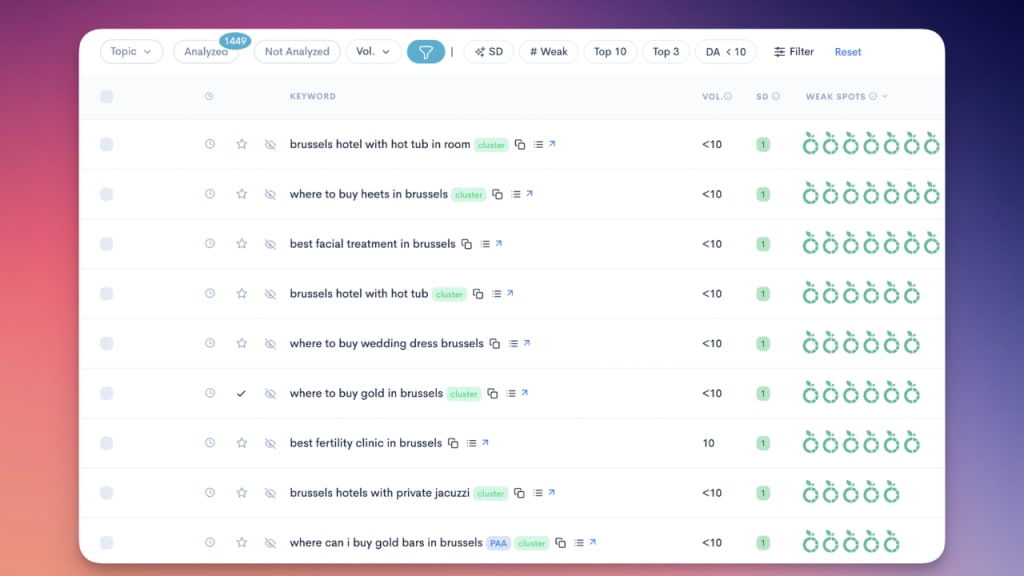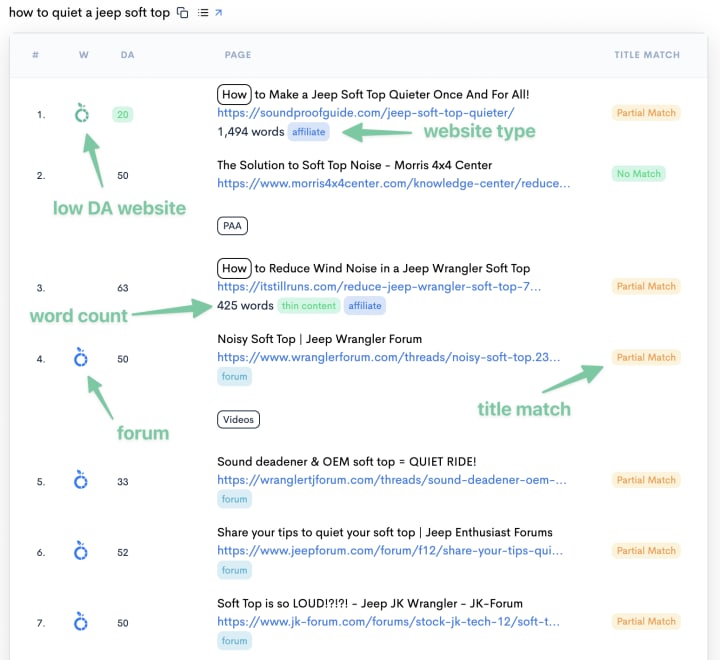Niche Website Goldmine: Uncover the Secret Weapon for Keyword Domination
Keyword research forms the cornerstone of a successful niche website content strategy. By understanding your target audience's search intent and identifying the right keywords, you can craft content that attracts readers, establishes your authority, and ultimately fuels website growth

In the vast landscape of the internet, niche websites stand as beacons for targeted audiences. But attracting your ideal readers requires a strategic approach, and the foundation of that strategy lies in keyword research. Unearthing the perfect keywords is like discovering a hidden treasure map, guiding you towards content that resonates with your audience and fuels website growth. Looking for keyword ideas ? 👉 Generate longtail keyword ideas Here
This comprehensive guide delves into the world of keyword research for niche websites, equipping you with the knowledge and tools to identify valuable keywords and craft content that ranks high in search results. We'll explore:
The Significance of Keyword Research for Niche Websites: Why keyword research is the cornerstone of your niche content strategy.
Keyword Types Demystified: Understanding head terms, body keywords, and long-tail keywords for optimal reach.
Keyword Difficulty: Friend or Foe?: How to assess keyword difficulty and choose keywords that are both relevant and achievable.
Unveiling the Low-Hanging Fruit: Strategies for Finding Low-Competition Keywords: Discover untapped potential with low-competition keywords.
Competitive Keywords: Not All Battles are Created Equal: Learn how to tackle competitive keywords with the right tactics.
Empowering Tools for Your Keyword Research Journey: Explore a range of free and paid tools to streamline your research process.
Introducing LowFruits.io: Your Niche Keyword Research Powerhouse: Unveiling the benefits of LowFruits.io for niche website owners.
Crafting Content that Converts: How to Leverage Your Keyword Research: Transforming your keyword findings into captivating and SEO-friendly content.
The Significance of Keyword Research for Niche Websites
Imagine pouring your heart and soul into crafting fantastic content, only to have it languish in the depths of search engine results pages (SERPs). That's the unfortunate reality that awaits websites neglecting keyword research. Effective keyword research acts as a bridge, connecting your content with the specific searches your target audience is conducting.
Here's why keyword research is crucial for niche websites:
Targeted Traffic: By identifying keywords relevant to your niche, you attract visitors genuinely interested in your content. This translates to higher engagement and a more loyal audience.
Content Direction: Keyword research reveals not just what people are searching for, but also the specific questions and pain points within your niche. Use this insight to craft content that addresses those needs and positions your website as a valuable resource.

Improved Search Engine Ranking: Strategic keyword integration within your content signals to search engines the relevance of your website to specific search queries. This, in turn, boosts your rankings and increases organic traffic. Looking for keyword ideas ? 👉 Generate longtail keyword ideas Here
Content Gap Identification: Keyword research can uncover topics within your niche that haven't been extensively covered yet. This presents an opportunity to establish yourself as a thought leader and fill the knowledge gap.
Keyword Types Demystified: Choosing the Right Weapon for the Fight Not all keywords are created equal. Understanding the different types of keywords is essential for making informed decisions in your research process. Here's a breakdown of the three main categories:
Head Terms: These are broad, single-word keywords with high search volume but fierce competition. Examples include "fitness" or "gardening." While head terms can generate a lot of traffic, ranking for them can be incredibly challenging for niche websites.
Body Keywords: These are more specific keyword phrases that offer a better balance between search volume and competition. Examples include "best fitness trackers" or "organic gardening tips." Targeting body keywords allows you to reach a more targeted audience with a higher chance of ranking.
Long-Tail Keywords: These are highly specific keyword phrases with lower search volume but significantly less competition. Examples include "best fitness trackers for women under $100" or "organic gardening tips for beginners in cold climates." Long-tail keywords are ideal for niche websites, allowing you to target a very specific audience with a strong likelihood of ranking high.
Keyword Difficulty: Friend or Foe?
Keyword difficulty is a metric that indicates the level of competition associated with a particular keyword. While high-volume keywords might seem attractive, consider the resources and effort required to rank for them. A more balanced approach involves incorporating a mix of keyword difficulty levels:
Low-difficulty keywords: These are ideal for building momentum and establishing your website's authority within your niche. Consider them stepping stones to tackling more competitive terms later.
Medium-difficulty keywords: The sweet spot, offering a balance between search volume and competition. These keywords require more effort to rank for but can generate significant traffic.
High-difficulty keywords: While these keywords boast the highest search volume, they might require a well-established website with substantial backlinks to secure a top ranking.
Unveiling the Low-Hanging Fruit: Strategies for Finding Low-Competition Keywords
Niche websites can thrive by focusing on low-competition keywords. These hidden gems offer a fertile ground for attracting targeted traffic and establishing yourself as an authority within your niche. Here are some effective strategies to unearth these low-competition keywords:

Get Granular: Think beyond single words and explore long-tail keywords that are highly specific to your niche. For example, instead of targeting "fitness," explore terms like "calisthenics workout routines for at-home moms." Looking for keyword ideas ? 👉 Generate longtail keyword ideas Here
Leverage Online Communities: Dive into forums, discussion boards, and social media groups within your niche. Look for the questions people are actively asking and the topics being passionately debated. These discussions often reveal valuable long-tail keyword opportunities.
Embrace the Power of Related Searches: When conducting your research on search engines, pay close attention to the "related searches" section at the bottom of the results page. These suggestions can spark new ideas for long-tail keywords relevant to your niche.
Think Like Your Audience: Put yourself in the shoes of your ideal reader. What questions might they have? What specific challenges are they facing? Brainstorm keyword phrases that reflect their needs and pain points.
Utilize Free Keyword Research Tools: Several free tools can assist your low-competition keyword hunt. Explore options like Google Keyword Planner, AnswerThePublic, and Ubersuggest. These tools offer insights into search volume, keyword suggestions, and related searches, helping you identify hidden gems.
Competitive Keywords: Not All Battles are Created Equal
While low-competition keywords offer a great starting point, completely ignoring competitive keywords would be a missed opportunity. Here's how to strategically approach competitive keywords:
Focus on Long-Tail Variations: Even for highly competitive head terms, there's likely a treasure trove of long-tail variations with lower competition but still relevant search volume. Explore these variations to target a more specific audience within the broader topic.
Content Quality is King: When competing for high-volume keywords, the quality of your content becomes paramount. Aim to create comprehensive, informative, and engaging content that surpasses what's currently ranking in the SERPs.
Backlink Building is Essential: High-quality backlinks from reputable websites act as a vote of confidence in the eyes of search engines. Building backlinks takes time and effort, but it's crucial for establishing authority and increasing your chances of ranking for competitive keywords.
Consider Paid Search Advertising: Paid search advertising platforms like Google Ads can be a valuable tool to reach a wider audience even for competitive keywords. This can be particularly effective when combined with an organic SEO strategy.
Empowering Tools for Your Keyword Research Journey
Keyword research doesn't have to be a daunting task. Several free and paid tools can streamline the process and help you discover valuable keywords for your niche website. Here's a glimpse into some popular options:
Free Tools:
Google Keyword Planner: A free tool from Google that offers search volume estimates and keyword suggestions. While not the most sophisticated tool, it's a great starting point for basic research. Looking for keyword ideas ? 👉 Generate longtail keyword ideas Here
AnswerThePublic: This free tool excels at generating long-tail keyword variations based on your seed keyword. It uses prepositions and questions to create a visual representation of potential search queries, sparking a wealth of ideas.
Ubersuggest: Another free tool offering keyword suggestions, related searches, and search volume estimates. It also provides competitor website analysis, helping you understand the competition landscape for your target keywords.
Paid Tools:
Ahrefs: A powerful paid toolset offering comprehensive keyword research features, including keyword difficulty score, search volume estimates, and competitor analysis. Additionally, Ahrefs provides valuable backlink data, crucial for tackling competitive keywords.
SEMrush: Another well-regarded paid toolset with robust keyword research capabilities. SEMrush offers keyword difficulty scores, search volume data, and competitor keyword research insights. It also includes features for on-page and off-page SEO analysis.
Moz Pro: A comprehensive SEO toolset including keyword research features. Moz Pro offers keyword difficulty scores, search volume estimates, and competitor research tools. It also provides on-page SEO analysis and link-building suggestions.
Introducing LowFruits.io: Your Niche Keyword Research Powerhouse
While the tools mentioned above offer valuable functionalities, LowFruits.io caters specifically to the needs of niche websites. Here's how LowFruits.io empowers you to conquer the niche keyword research landscape
Laser Focus on Niche Targeting: LowFruits.io understands the unique challenges of niche websites. It provides targeted keyword suggestions relevant to your specific niche, saving you time and effort in the research process.
Long-Tail Expertise: LowFruits.io excels at identifying high-potential long-tail keywords that perfectly capture the search intent of your niche audience. This allows you to target highly relevant traffic with a strong likelihood of conversion.
Competition Insights at Your Fingertips: LowFruits.io goes beyond simply presenting keyword difficulty scores. It offers a comprehensive analysis of the competition landscape, including the websites currently ranking for your target keywords and their backlink profiles. This information empowers you to develop a data-driven content strategy that surpasses the competition. Looking for keyword ideas ? 👉 Generate longtail keyword ideas Here
Content Idea Inspiration: LowFruits.io doesn't stop at keywords. It analyzes search trends and user queries to generate content topic ideas that resonate with your niche audience. This eliminates writer's block and ensures your content calendar is brimming with engaging topics.
Effortless Integration: LowFruits.io seamlessly integrates with popular content management systems (CMS) like WordPress, allowing you to seamlessly export your chosen keywords and topic ideas directly into your content creation workflow. This saves time and streamlines your content creation process.
Affordable Pricing: LowFruits.io offers competitive pricing plans specifically tailored to the needs of niche website owners. This makes it an accessible and cost-effective solution for businesses of all sizes.
Crafting Content that Converts: How to Leverage Your Keyword Research
Keyword research is a powerful tool, but it's only half the battle. Now comes the crucial step of transforming your findings into compelling content that attracts and converts your target audience. Here are some tips for maximizing the impact of your keyword research:
Strategic Keyword Integration: Don't just stuff keywords into your content. Integrate them naturally throughout your writing, focusing on providing value to the reader. Utilize keywords in your title tags, meta descriptions, headers, and throughout the body of your content.
Prioritize User Intent: When creating content, always keep user intent at the forefront of your mind. What are users hoping to achieve with their search queries? Craft content that directly addresses their needs and provides a satisfying answer to their questions.
Content Optimization for Readability: Don't neglect the importance of readability. Write in a clear, concise, and engaging style that keeps your readers captivated. Use bullet points, subheadings, and visuals to break up text and enhance understanding.
Incorporate Internal Linking: Guide users deeper into your website by strategically linking to relevant content. This improves website navigation, user experience, and helps search engines understand the structure of your website.
Content Promotion is Key: Don't just publish and pray. Actively promote your content on social media, through email marketing, and by guest blogging on relevant websites. This broadens your reach and drives more qualified traffic to your content.
Conclusion: Keyword Research - The Key to Unlocking Niche Website Success
Keyword research forms the cornerstone of a successful niche website content strategy. By understanding your target audience's search intent and identifying the right keywords, you can craft content that attracts readers, establishes your authority, and ultimately fuels website growth. Utilize the strategies and tools outlined in this guide, and consider the advantages of LowFruits.io as your niche keyword research partner. With a data-driven approach and captivating content, your niche website can blossom into a thriving online destination. Looking for keyword ideas ? 👉 Generate longtail keyword ideas Here
**This site contains product affiliate links. We may receive a commission if you make a purchase after clicking on one of these links.
About the Creator
Steve R. Anderson
Digital Marketing I Affiliate Marketing buff
Enjoyed the story? Support the Creator.
Subscribe for free to receive all their stories in your feed. You could also pledge your support or give them a one-off tip, letting them know you appreciate their work.






Comments
There are no comments for this story
Be the first to respond and start the conversation.